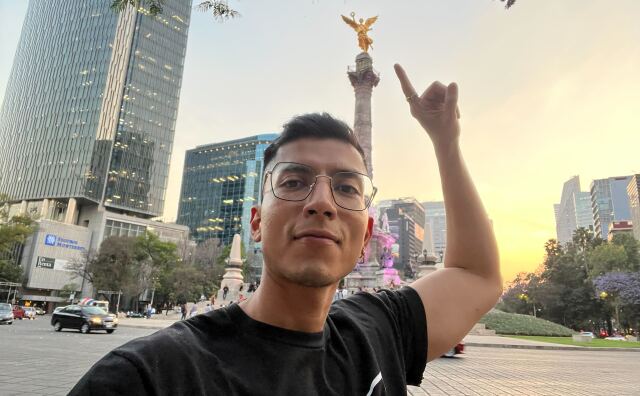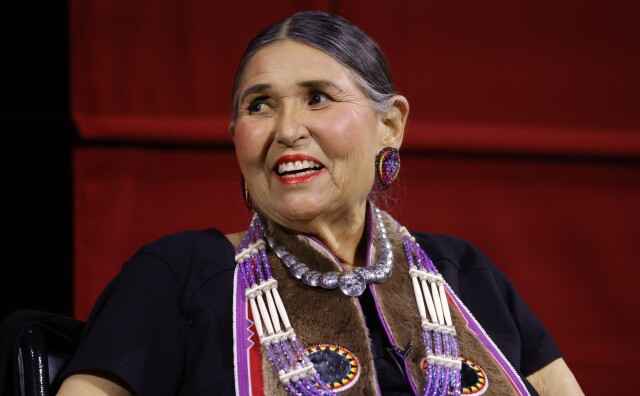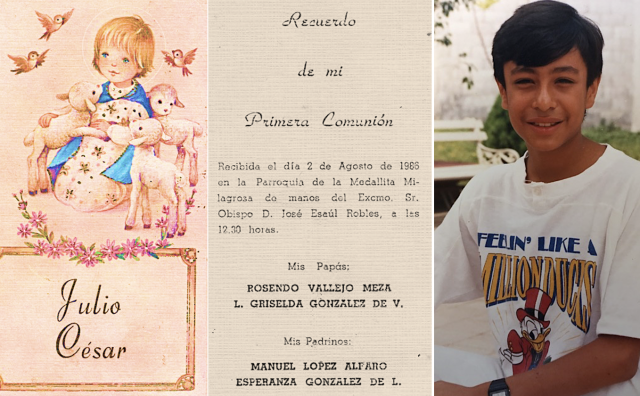Almost immediately after the L.A. city council tape scandal broke last fall, a team of us at LAist knew we wanted to tell the story in a narrative long form podcast. But what would that podcast sound like? What issues would we examine?
It’s the kind of story where most people have heard about it, but the details are often hazy. I’d bring it up and people would say, “oh yeah… what did they say on those tapes?” “What happened to those people?” We wanted to make a series that could help people make sense of the scandal, a year later.
We gravitated to the story of former city council president Nury Martinez. Prior to the scandal she was considered a homegrown success story for Pacoima and the San Fernando Valley. She was known as a champion for the working class and immigrant families. And then, she sabotaged her career with her own words. She became a prime example of anti-Blackness and colorism in the Latino/x community. We wanted to explore the tension between what she represented before and after the scandal as a way of understanding the limits of representational politics.
As current L.A. city councilmember Eunisses Hernandez told me, “I think identity politics in that way can constrain us from meeting the needs of our district and the people who live there. Because time and time again, we've seen reflections of leaders who look like us, who are supposed to represent us, making decisions that totally throw our communities under the bus.”
Examining anti-Black racism, colorism and Latino political power
My interest in the tape leak scandal came from my experience covering Latino/x identity for the past decade both at LAist and previously as a producer at NPR’s Latino USA. I produced an episode about the scandal shrouding the American Dirt novel. And I was the executive producer on our series about former L.A. County Sheriff Alex Villanueva, which delved into a similar tension between what the Sheriff represented prior to his term in office, and during. I saw how the conversation about the L.A. City Council tapes was playing out in Latino/x spaces, bringing up the most difficult and painful issues in the community — anti-Black racism, colorism, and what Latino political power even means.
-
What candidates can — and can't — say they do
-
Nonprofit's launching fundraiser to keep it afloat
-
USC study documents what residents want from trees
When I first heard audio from the leaked tapes, I felt a shame similar to when a family member says an off-the-cuff racist remark in front of a friend who’s meeting them for the first time. I was unfortunately familiar with the kind of language Martinez and the other Latino leaders had used. My family is from Argentina and when I was growing up, I never questioned certain turns of phrase that, looking back now, I understand are rooted in racist and prejudiced thinking.
We have always called my great uncle, who is white, El Tío Negro because he is slightly darker than his brother. When I visit Argentina, I hear people referring to all Asians as chinos, regardless of their actual country of origin. And until two years ago I would use the word quilombo to refer to “a mess,” until I learned that the original meaning of quilombo was a hideout for escaped African slaves in Latin America. I wanted this series to really explore a lot of these racist attitudes that are still rampant in our communities.
Why Martinez agreed to speak
We had assumed that Martinez would not agree to be interviewed. She had not done any interviews since her resignation in October 2022. Initially, we approached the series as what’s commonly referred to in journalism as a “work around” — tracking down people close to her, including fellow politicians, friends, and critics, to fill in the details of her life. And so, when our senior producer, Emily Guerin, called Martinez and left a message to alert her to the project and ask for an interview, we were shocked when Martinez called back.

Martinez, Emily and I met in person soon after. We sat in the former city council president’s kitchen for four hours, talking off the record. We made it clear that it was not our goal to redeem her, or help her seek forgiveness — that that would be for the public to decide for themselves. We were interested in the part of the story that was still unknown — how she experienced the scandal and the aftermath. And we also wanted to ask her difficult questions about the specific, racist things that she said on the tape. After a month and a half of deliberation, she agreed to be interviewed.
I knew there would be skepticism, even criticism, of the decision to interview her at all. We discussed this extensively among our team, including with editors and reporters who had covered Los Angeles politics for decades. I also read extensively. The books I drew on included We Will Not Cancel Us by adrienne maree brown and Which Side Are You On? by Ryan Lee Wong. Both books underscore the message that real progress is made not through walling off part of our communities, but rather through consistent accountability and honest, sometimes uncomfortable, dialogue.
That dialogue included lengthy interviews with those who were spoken about directly on the tapes — former councilmember Mike Bonin, current councilmembers Marqueece Harris Dawson, Nithya Raman and Eunisses Hernandez. And I spoke to those who were impacted, including Odilia Romero, who heads CIELO, an Indigenous human rights organization. And finally, I sought context from the scholar Tanya Hernández, who has studied the history of anti-Blackness in Latino communities. All of these interviews were conducted before we spoke to Martinez herself, and deeply informed specific questions that were asked.
Difficult conversation
But I knew the most difficult conversation was going to be with Martinez herself. I was hopeful that she would show deep reflection on why her words were so hurtful. She placed no limits on the interview, and for three of the six hours we recorded, we focused on repeated questions about every derogatory comment she made and the underlying deeper systemic concerns about them.
There are people who think that Martinez shouldn’t be heard from again given what she said. I understand that point of view. My intention with this series is to continue to address the thorny and difficult issues at the heart of the scandal, to not let them go. I want Latinos to do better.
Listen to Episode 1
How To LA covers the making of the podcast
Our How To LA podcast talked to Cereijido about the making of this season of Imperfect Paradise .












